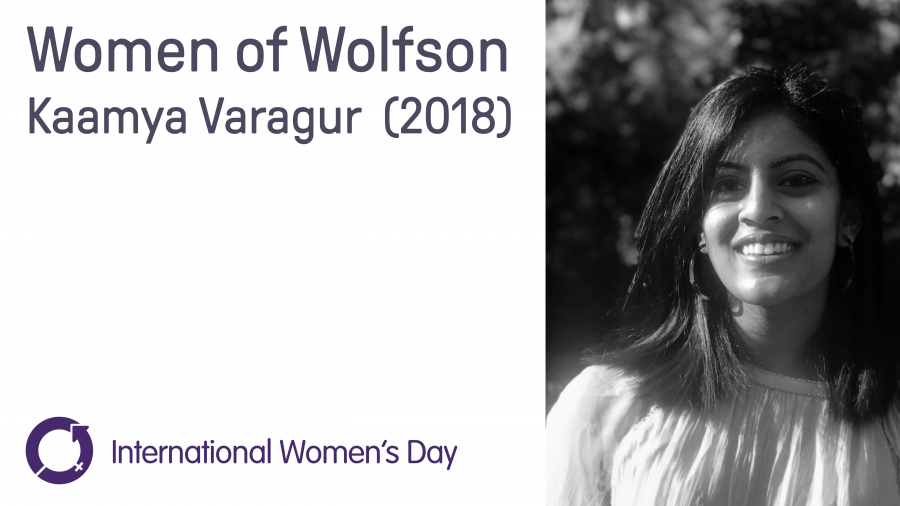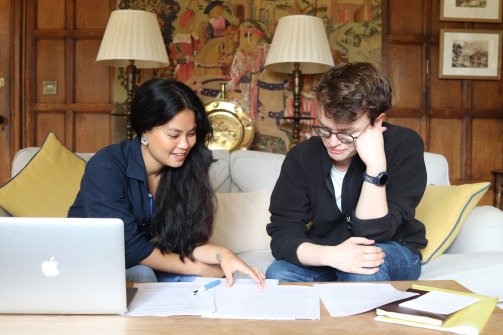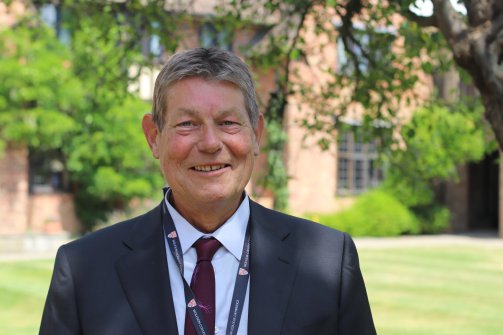New Press Fellows arrive at Wolfson

For International Women's Day we are bringing you stories of the Women of Wolfson, past and present. Current MPhil student and Gates Scholar, Kaamya Varagur, describes her research on mother-infant singing and how she plans to combine music with medicine.

Kaamya Varagur, of Edison, New Jersey is pursuing her MPhil in Music Studies after obtaining her undergraduate degree at Princeton University in neuroscience with a minor in music performance — and before she starts medical school in St. Louis, Missouri. Unlike in the UK, where students attend medical school immediately after A-levels, in the US it is typical to first do an undergraduate degree and then head to medical school. But Kaamya's time in Cambridge at the Centre for Music & Science isn't a diversion from her academic path but integral to it.
"I've known since high school that I wanted to be a medical doctor. But I'm interested in doing work that is relevant to bringing music into a clinical setting. I would like to practice fetal medicine or paediatric neurosurgery, so I hope to engage with community music programs that operate out of healthcare settings throughout my life."
The research that Kaamya is doing whilst here, for which she received a Gates Scholarship, investigates the effects of mother-infant singing, both in terms of attachment and in its effects on maternal stress. Her study focuses on immigrant mothers.
"Previous research has shown that immigrant mothers communicate differently with their infants than non-immigrant mothers in the host country and in mothers in their country of origin. There are specific behaviours that we can observe, in particular interactional synchrony and expressive timing. The basic concepts are synchronising with your baby vocally and responding contingently, so listening to your baby and responding appropriately. Deficits in those features are often found in women who have post-natal depression, which can lead to more depressed responses from infants as well. And a 2003 study showed that immigrant mothers also have decreased interactional synchrony and expressive timing. And immigrant mothers may be especially prone to depressive symptoms and depression because of obvious the accumulation of stressors related to managing the interplay between home and host customs and traditions, on top of all the stresses of motherhood."
The study participants will be asked to fill out several psychological questionnaires to assess their baseline mental health and wellbeing. Then they will spend a nine-minute sessions singing to their babies with wrist monitors that measure their heart rate and heart rate variability during the session.
"As physiological responses go, researchers tend to measure salivary cortisol, but that has up to a couple of hours of lag time, so you can't know in real time if your intervention is having any effect." Kaamya will also record the sessions so that she can closely examine micro-level features of the mother-infant vocal interaction.
It's not the first time Kaamya looked at the effects of maternal singing. She explains that one of the problems for babies who are born prematurely and have to spend time in a NICU (Neonatal Intensive Care Unit) is that they are moved from the womb to the NICU so quickly. In the womb the baby is constantly exposed to the mother's internal environment and voice.
"Auditory connections to the brain are developed in the womb and they are trained by the inputs the foetus receives. Humans are altricial, our brains are very much less developed at birth than our primate relatives. The benefit of this is that a human infant is very much shaped by its early environment. But that learning doesn't start the moment you are born; a lot happens in the womb. There are a variety of psychosocial interventions currently in use in NICUs and maternity wards. One of them is to make recordings of mother's voices, which are played to babies in incubators. It builds on research that shows early musical exposure for the fetus is really valuable for developmental processes and also for attachment."
Kaamya worked as a summer researcher for an organisation run by Carnegie Hall in New York called the Lullaby Project, which works to bring music enrichment to mothers in underserved areas. The programme pairs a teaching artist with pregnant women to create customised lullabies that can be sung or played to babies in the event they are separated from their mothers for medical or other reasons.
"An aspect of these music-based interventions that is often overlooked is the benefit to the mothers themselves. Writing and singing a lullaby for your child can end up being pretty cathartic. One of the most unique places the Lullaby Project works is at Rikers Island (a large prison complex in New York). They work with incarcerated women, and you can tell from their writing how tough it is for them to be apart from their babies. There's a growing interest in singing interventions in post-natal depression and two researchers from the Royal College of Music, Daisy Fancourt and Rosie Perkins have published some really robust studies. I met up with Rosie this week and she gave me some good recruiting tips."
Being a Gates Scholar offers advanced opportunities for learning and networking. When Kaamya arrived in Cambridge, she attended an orientation trip with fellow Gates Scholars in the Lake District.
"Gates is very social-impact centred, so you would expect there to be a lot of medical students and researchers, but there a people from a lot of different fields. There are lectures and scholar's symposiums to help you with your research, and trips and events organised by the students themselves. You can see that the Gates network is very strong, they are all people who want to improve the lives of other people across the world, and I expect to keep in touch with many of the people I've met here."
Kaamya is also enjoying Wolfson. "I spend a lot of time in the Club Room working, and I've befriended Loradana (in the Coffee Bar) because I'm learning Italian. I'm so happy with my accommodation, and I've got a bicycle. I also enjoy getting cheap flights from Stansted — I recently went to Morocco with one of the Gates Scholars who is from there. I don't think I'll be riding a bicycle or flying to a different country for the weekend when I get to St. Louis."
Performing is part of Kaamya's life here as well. She is a choral scholar at Wolfson and sings in the College Choir, as well as the King's Voices and the University Chamber Choir ("It's a lot of ensembles but not a lot of time actually singing.") Currently she is recruiting for her study before flying to Dublin for the weekend.
Photo by Danielle Stephenson, Princeton University







